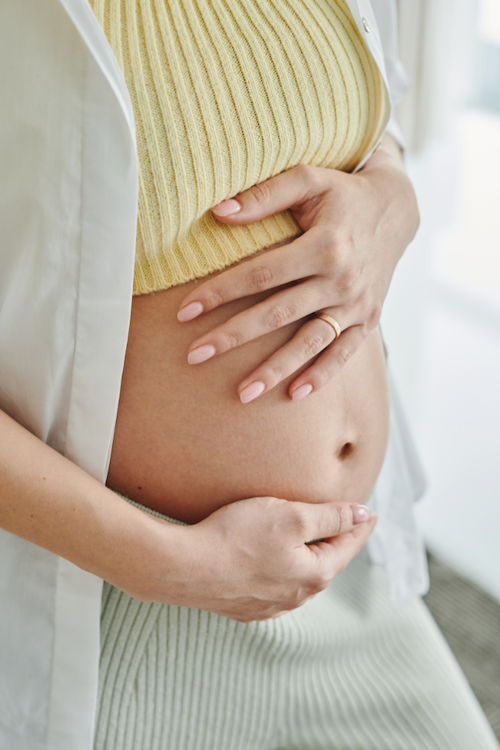Feeling some postpartum dizziness breastfeeding? You’re not alone! Feeling some dizziness in the first weeks postpartum and while breastfeeding is common and can be improved with some simple tips.
However, there are times when postpartum dizziness is cause for concern so it’s always a good idea to bring up your symptoms with your healthcare provider as postpartum dizziness could be a sign of a more serious medical condition.

Postpartum Dizziness Breastfeeding: Most Common Causes
The postpartum period is a time of intense transformation for new mothers as the new mother’s post-pregnancy hormones adjust, breastfeeding begins, and her body starts to heal from birth.
During this time, especially the early weeks, feeling postpartum dizziness breastfeeding can be common and alarming to a new mother who may be concerned about her health or safely carrying her baby. Luckily, there are a few behaviors and nutritional modifications that can be made to help improve dizzy spells and ideally eliminate them completely.
Some of the most common causes for feeling postpartum dizziness breastfeeding are:
- Drop in blood sugar: Breastfeeding requires a lot of energy and is associated with a drop in blood sugar, this dip in blood sugar can cause dizziness which is why it is a great idea to have a balanced snack while breastfeeding to help keep your blood sugar levels stable.
- Dip in blood pressure: When a breastfeeding mother is sitting down, or side-lying to nurse her baby, and then gets up quickly this can cause a quick drop in blood pressure that can dizziness.
- Sleep deprivation: Lack of sleep has been linked to headaches, dizziness, and vertigo as the brain has a more difficult time with spatial perception.
- Dehydration: Milk production requires plenty of water and extra fluids, which makes it easy to become dehydrated if you are not keeping up with your fluid intake.
- Increased energy needs: Breastfeeding mothers need an additional ~500 calories per day to meet the energy needs associated with breastfeeding. If new moms do not consume enough calories postpartum they may experience postpartum dizziness breastfeeding as breastfeeding is an energy-intensive activity.
- Hormonal fluctuations: There are dramatic hormonal fluctuations that occur immediately postpartum and in the weeks and months after the birth of your baby, which can cause dizziness, especially while breastfeeding.
- Postpartum headaches: Postpartum headaches can be caused by a shift in hormones or dehydration as it can be difficult to keep up with the increased fluid needs associated with creating breast milk. Postpartum headaches can also cause dizziness, but will often resolve once postpartum hormones begin to balance out or any dehydration/energy needs have been met.

Why Do I Feel Dizzy After Breastfeeding?
Breastfeeding and maintaining your milk supply to nourish your new baby is an energy intensive process that can reduce blood sugar levels, which can lead to feeling postpartum dizziness breastfeeding.
This combined with the fact that many new moms find it difficult to prioritize nourishing themselves and drinking enough fluids, breastfeeding can further lead to dehydration and a decrease in blood sugar, all of which can cause dizziness.
There is also a condition called benign paroxysmal positional vertigo, which is triggered by changes to the position of your head. If you are breastfeeding in a side-lying or reclined position and get up quickly, it could cause dizziness.
Why Do I Feel Dizzy After Pumping?
Pumping stimulates your body into thinking that you are nursing your baby, which means that the symptoms you may experience while breastfeeding your baby can also be experienced while pumping. In order to reduce dizzy spells while pumping it is important to have a balanced snack and drink enough fluids while pumping.
How Long Does Postpartum Dizziness Last?
Often postpartum dizziness can subside when you make simple dietary and behavior changes, or as hormonal changes shift back to their pre-pregnancy state. This can take 3-6 months or longer if breastfeeding. If you are experiencing postpartum dizziness breastfeeding and it does not improve with dietary and lifestyle changes it is worth reaching out to your healthcare provider.

Postpartum Dizziness Breastfeeding: Best Helpful Tips To Feel Better
- Increase fluids: Dizziness can be directly related to dehydration, and since breastfeeding requires additional fluid to produce breastmilk it is essential that you increase your fluid intake and make sure you are drinking enough water.
- Increase mineral intake: Minerals are considered the “spark plugs of the body” and are responsible for helping absorb water and move it into the cells. Specifically, potassium, chloride, and sodium can be beneficial if you are experiencing dizziness but feel as though you are drinking enough fluids.
- Eat a balanced diet: Eating a balanced diet of carbohydrates, protein, fat, and fiber will help you balance your body’s blood sugar and maintain energy levels. This can help reduce feelings of dizziness and ensure you are getting enough calories to support the energy intensive process of breastfeeding.
- Go from laying/sitting to standing slowly: If you are nursing laying down or reclined and have been experiencing postpartum dizziness breastfeeding then try to slowly go from laying down, to sitting, to standing. This will help with the temporary drop in blood pressure that occurs when you quickly change positions.
- Maximize sleep stretches: Getting long-stretches of sleep is impossible with a new baby who needs to eat every few hours, but making sure you maximize the sleep stretches you can get is so important. Try involving your partner in the night feeds by having them change and soothe the baby sometimes so you can nurse and ideally get right back to sleep.
- Eat a snack and drink fluids at every nursing session: As a mom of two, I know just how hard it can be to prioritize your own nutrition while caring for your baby, which is why keeping snacks and a water bottle nearby while nursing can really help ensure you are getting enough calories and fluids.
Medical Conditions To Be Aware Of
In the early days and weeks postpartum there are two serious health conditions to be on the lookout for. Specifically, postpartum preeclampsia and postpartum hemorrhage are two emergency medical conditions that medical providers are on the lookout for and require emergency care and medical treatment.
While postpartum dizziness can be a sign of both of these serious medical conditions, postpartum dizziness alone does not mean you have one of the following conditions. This is why it is so important to understand the signs of postpartum preeclampsia and postpartum hemorrhage and always check with your healthcare provider about any postpartum dizziness as it could be a sign of a more serious medical condition.

Postpartum Preeclampsia Signs and Symptoms:
Postpartum preeclampsia is a rare condition that can occur after childbirth, typically within the first 48 hours to six weeks after delivery. It is a related condition to preeclampsia, which is one of the pregnancy complications pregnant women are screened for during pregnancy.
Postpartum preeclampsia however occurs after birth and is characterized by high blood pressure and organ dysfunction. Postpartum preeclampsia can be life-threatening if not recognized and treated promptly, which is why being aware of the signs and symptoms of postpartum preeclampsia is so important.
Signs and symptoms of postpartum preeclampsia may include:
- High blood pressure: A blood pressure reading consistently above 140/90 mmHg.
- Severe headaches: Pounding or persistent headaches that don’t go away with over-the-counter pain relievers.
- Vision changes: Blurred vision, sensitivity to light, or seeing spots.
- Swelling: Sudden and excessive swelling in the hands, face, or feet.
- Abdominal pain: Pain or discomfort in the upper abdomen, usually on the right side.
- Shortness of breath and dizziness: Dizziness and difficulty breathing or catching breath even during rest or after increased fluids
- Nausea and vomiting: Persistent nausea or vomiting that doesn’t improve.
- Changes in urination: Decreased urine output or dark-colored urine.
If any of these symptoms occur after childbirth it is important to reach out to your healthcare provider for an assessment as preeclampsia requires prompt diagnosis, and immediate medical care to manage and prevent complications.
Postpartum Hemorrhage Signs and Symptoms:
Postpartum hemorrhage (PPH) is a serious condition when significant blood loss occurs after childbirth, and it is a leading cause of maternal mortality and morbidity worldwide. While postpartum hemorrhage most commonly occurs immediately after delivery or within the first 24 hours, it can also happen up to six weeks postpartum.
Because postpartum hemorrhage involves a significant loss of blood it is considered a medical emergency and immediate medical attention is required to stabilize the mother and prevent any further complications.
Signs and symptoms of postpartum hemorrhage may include:
- Excessive bleeding: Heavy bleeding that saturates a sanitary pad within an hour.
- Large blood clots: Passing large blood clots or tissue fragments.
- Dizziness or lightheadedness: Feeling faint or weak due to blood loss.
- Rapid heart rate: An unusually fast heart rate (tachycardia) due to decreased blood volume.
- Pale skin: Skin color appears paler than usual due to reduced blood supply.
- Low blood pressure: Hypotension leading to dizziness or fainting.
- Abdominal pain: Cramping or discomfort in the abdomen.
Postpartum hemorrhage is a medical emergency, and immediate intervention is essential to control bleeding, stabilize the mother’s condition, and prevent further complications.
While these serious conditions are scary to think about, they are important to understand and be aware of as it is crucial for postpartum women to seek medical attention if any concerning symptoms arise after childbirth.
If you are experiencing postpartum dizziness breastfeeding, hopefully knowing the most common causes and how to improve dizziness while breastfeeding will greatly reduce your postpartum dizziness breastfeeding spells.
If your dizzy spells do not quickly improve with rest, hydration, sleep, and additional caloric intake it is always a good idea to reach out to your medical provider to rule out any more serious postpartum medical condition.





















